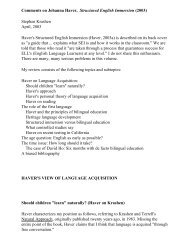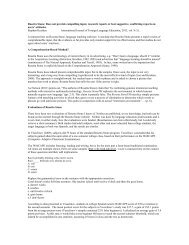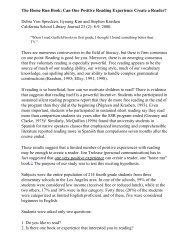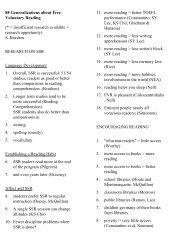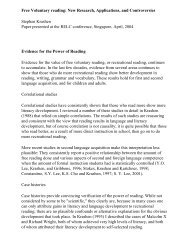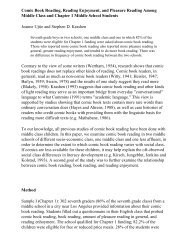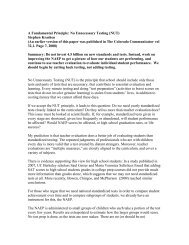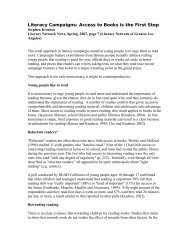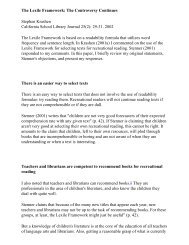Second Language Acquisition and Second ... - Stephen Krashen
Second Language Acquisition and Second ... - Stephen Krashen
Second Language Acquisition and Second ... - Stephen Krashen
You also want an ePaper? Increase the reach of your titles
YUMPU automatically turns print PDFs into web optimized ePapers that Google loves.
adulthood. A. Smith (1966) describes a case of a man who underwent left<br />
hemispherectomy at age 48. The surgery left him nearly totally speechless:<br />
"E. C.'s attempts to reply to questions immediately after operation were totally<br />
unsuccessful. He would open his mouth <strong>and</strong> utter isolated words, <strong>and</strong> after<br />
apparently struggling to organize words for meaningful speech, recognized his<br />
inability <strong>and</strong> would utter expletives or short emotional phrases (e.g. 'Goddamit').<br />
Expletive <strong>and</strong> curses were well articulated <strong>and</strong> clearly underst<strong>and</strong>able. However, he<br />
could not repeat single words on comm<strong>and</strong> or communicate in propositional speech<br />
until 10 weeks post-operative." Expressive speech showed some development in E.<br />
C., but Smith reported that his creative language was still "severely impaired" 8<br />
months after the operation.<br />
A patient studied by Whitaker (1971) suffering from nonfluent aphasia exhibited an<br />
interesting sort of automatic speech behavior: he responded to nearly every question<br />
or attempt at conversation with the utterance "What'cha gonno do right now? yea<br />
yea". Whitaker points out to the student of neurolinguistics that one cannot use such<br />
utterances as data in determining a patient's true linguistic competence "... on the<br />
basis of (this one) utterance, it would be rather farfetched to assume that L. S. (the<br />
patient) had retained the WH-question transformation <strong>and</strong> correct pronominal<br />
reference. ..." (pp. 145-146).<br />
Thought to be related to automatic speech are "ictal speech mechanism", words or<br />
utterances spoken by psychomotor epileptics during, before, or immediately after<br />
seizures. Ictal speech mechanisms consist of stereotyped expressions ("I beg your<br />
pardon") <strong>and</strong> emotional utterances which are spoken out of context. As in the case<br />
with AS associated with the right side of the brain as well as the left, Serafatinides<br />
<strong>and</strong> Falconer (1963), in agreement with other studies, found that "of 15 patients<br />
with truly ictal speech automatisms 4 were operated on the left side <strong>and</strong> 11 on the<br />
right or recessive side" (p. 345).<br />
The neurolinguistic evidence, then, points to the fact that automatic speech is<br />
neurologically different from creative language in that it is localized on both sides<br />
of the brain, as opposed to just the left hemisphere, <strong>and</strong> can be preserved in cases of<br />
aphasia. If AS is related to routines <strong>and</strong> patterns, then routines <strong>and</strong> patterns may<br />
have a<br />
85



